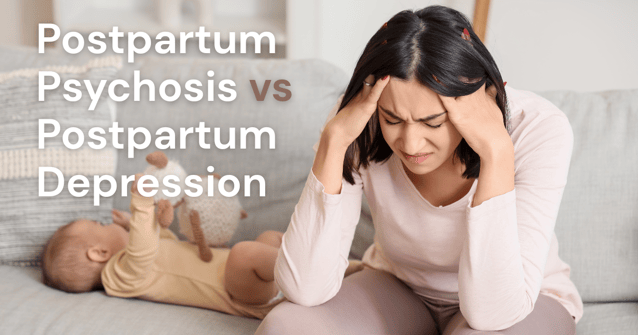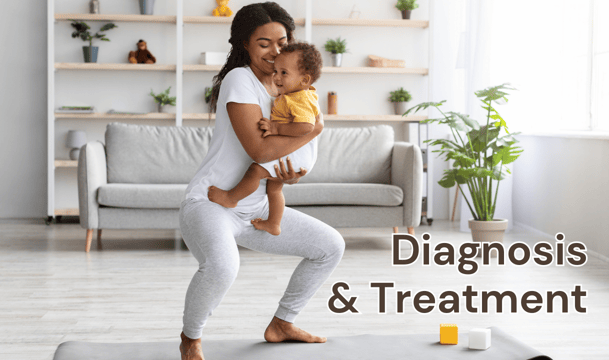Postpartum Psychosis vs Postpartum Depression: Know the Difference
6/11/20253 min read
The postpartum period is a whirlwind of emotions - joy, fear, love, and fatigue all wrapped into one intense chapter of life. But for some parents, particularly mothers, that chapter takes an unexpected turn into psychological distress. While postpartum depression (PPD) is more widely recognized, a lesser-known but far more severe condition—postpartum psychosis—can also occur.
Both are serious mental health concerns, but they are distinct in their symptoms, severity, and urgency. Knowing the difference between postpartum psychosis and postpartum depression can help families respond with the right level of care—and possibly save lives.
At Peace Temple, we’ve seen how critical early recognition and intervention can be. Let’s break down what sets these two postpartum disorders apart.


What Is Postpartum Depression?
Postpartum depression is a mood disorder that typically develops within the first few weeks to months after childbirth. It affects about 1 in 7 mothers, and symptoms can range from mild to debilitating.
Key Symptoms:
Persistent sadness or emotional numbness
Loss of interest in activities
Difficulty bonding with the baby
Fatigue or sleep disruption (beyond typical new parent exhaustion)
Changes in appetite
Guilt, shame, or feelings of worthlessness
Anxiety, panic attacks, or irritability
In severe cases, thoughts of self-harm or feeling like the baby would be better off without you
These symptoms usually last weeks to months and can significantly impair a mother’s ability to function.
Importantly, women experiencing PPD typically remain grounded in reality. Their thoughts, while distressing, are usually recognizable as internal struggles rather than external threats.
Peace Temple’s postpartum support programs offer therapy, group support, and holistic care to help parents manage these emotional changes in a safe, non - judgmental space.
What Is Postpartum Psychosis?
Postpartum psychosis (PPP) is rare but extremely serious, affecting roughly 1 to 2 out of every 1,000 births. It is considered a psychiatric emergency, often emerging within the first two weeks after delivery, sometimes as early as 24 to 72 hours postpartum.
Unlike PPD, postpartum psychosis includes delusions, hallucinations, and detachment from reality. The condition can come on suddenly and escalate rapidly.
Key Symptoms:
Delusions (false beliefs that aren't based in reality)
Hallucinations (seeing or hearing things that aren't there)
Disorganized thinking or speech
Paranoia or extreme confusion
Mania or excessive energy with racing thoughts
Rapid mood swings
Reckless or impulsive behaviour
Thoughts of harming self or baby, often rooted in delusional logic
Women with postpartum psychosis may believe their baby is evil, that they are receiving divine commands, or that the world is ending. These beliefs are not just distressing—they are compelling, and the risk of harm is significantly higher than in depression alone.
Immediate psychiatric intervention is essential. If you or someone you know shows signs of PPP, call emergency services or go to the nearest hospital. At Peace Temple, we help families access urgent psychiatric referrals while offering compassionate aftercare once stability is restored.


How Are PPD and PPP Diagnosed?
Both conditions require clinical evaluation, but the process differs based on symptoms.
PPD is often diagnosed using screening tools like the Edinburgh Postnatal Depression Scale (EPDS) and a psychological interview to assess mood, sleep, appetite, and functional ability.
PPP is usually identified through urgent psychiatric assessment based on acute behavioural changes, risk factors, and reports from family or medical staff.
Diagnosis is not about labelling—it's about understanding what’s happening so the right treatment can begin.
What Causes These Conditions?
Both PPD and PPP are believed to result from a complex interaction of hormonal, genetic, and psychological factors.
Shared Risk Factors:
Personal or family history of depression, bipolar disorder, or psychosis
Hormonal shifts after childbirth
Sleep deprivation
Stress or trauma
PPP-Specific Risk Factors:
History of bipolar disorder or schizoaffective disorder
Previous episodes of psychosis
Discontinuation of psychiatric medication during pregnancy
At Peace Temple, we help women with known psychiatric conditions develop preventive care plans during pregnancy to lower the risk of postpartum psychiatric crises.
Treatment Options
For Postpartum Depression:
Therapy: Cognitive-behavioural therapy (CBT), interpersonal therapy (IPT), and group therapy have strong evidence.
Medication: Antidepressants can be safely used, even while breastfeeding, under medical supervision.
Supportive Care: Peer support, lifestyle changes, mindfulness practices, and sleep hygiene.
Peace Temple’s integrated approach combines psychological, emotional, and lifestyle interventions to provide whole-person healing.
For Postpartum Psychosis:
Immediate hospitalization to ensure safety of mother and child
Antipsychotic medications, mood stabilizers, or sedatives as needed
Ongoing psychiatric care, often including psychotherapy once stabilized
Family involvement in treatment planning and safety protocols
Recovery from PPP is possible—but it requires swift, specialized intervention and close follow-up care.
Final Thoughts: Awareness Saves Lives
Postpartum mental health is not a one-size-fits-all experience. While postpartum depression is more common, postpartum psychosis—though rare—demands immediate attention. Recognizing the signs, knowing the differences, and responding quickly can be the difference between a manageable episode and a crisis.
At Peace Temple, we are deeply committed to helping mothers, fathers, and families understand and navigate all facets of postpartum mental health. Whether you're dealing with persistent sadness or a sudden, frightening shift in reality—help exists, and healing is possible.
You don’t have to figure it out alone. And you shouldn’t have to.
